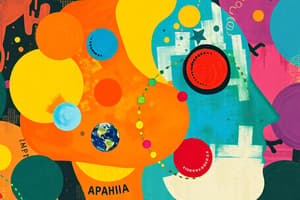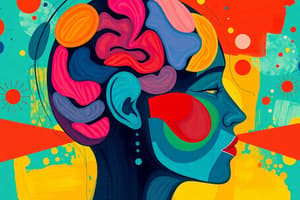Podcast
Questions and Answers
What term describes the ability of speakers of two different languages to understand each other?
What term describes the ability of speakers of two different languages to understand each other?
- Dialect Continuum
- Mutual Intelligibility (correct)
- Language Family
- Global Languages
Which term refers to a language that has no known relation to any other language?
Which term refers to a language that has no known relation to any other language?
- Pidgin
- Isolate Language (correct)
- Proto-language
- Dialect
What is a Dialect Continuum?
What is a Dialect Continuum?
- A theoretical ancestor of language families
- A single language spoken in a confined area
- A form of speech combining multiple languages
- A group of similar dialects spoken across geographical areas (correct)
What is the primary cause of language diffusion?
What is the primary cause of language diffusion?
Which of these is NOT a characteristic of a Pidgin language?
Which of these is NOT a characteristic of a Pidgin language?
What describes a regional or social variation of a language that includes differences in pronunciation, vocabulary, and grammar?
What describes a regional or social variation of a language that includes differences in pronunciation, vocabulary, and grammar?
What is the term for a group of languages that share a common ancestor?
What is the term for a group of languages that share a common ancestor?
Which process describes the creation of new words to reflect modern ideas or technologies?
Which process describes the creation of new words to reflect modern ideas or technologies?
What term refers to the evolution of languages over time?
What term refers to the evolution of languages over time?
Which of the following describes a language that has no known relationship with any other language?
Which of the following describes a language that has no known relationship with any other language?
What term is used for languages that develop from the mixture of two or more languages?
What term is used for languages that develop from the mixture of two or more languages?
Which process involves a shift in word order or structure in a language?
Which process involves a shift in word order or structure in a language?
What term describes the incorporation and spread of new words in a language?
What term describes the incorporation and spread of new words in a language?
What theory was developed by Stephen Krashen concerning language acquisition?
What theory was developed by Stephen Krashen concerning language acquisition?
Which of the following refers to the smallest unit of sound in language?
Which of the following refers to the smallest unit of sound in language?
What term describes the transfer of syntactic and morphological elements from one language to another?
What term describes the transfer of syntactic and morphological elements from one language to another?
Which theory proposes that language evolved from sounds made by people as they worked together?
Which theory proposes that language evolved from sounds made by people as they worked together?
Which stage of language development is characterized by a child's first appearances of two-word phrases?
Which stage of language development is characterized by a child's first appearances of two-word phrases?
What does the term 'Language Universals' refer to?
What does the term 'Language Universals' refer to?
Which researcher is associated with conditioning responses in language learning?
Which researcher is associated with conditioning responses in language learning?
Which language development theory connects natural cries to the origin of language?
Which language development theory connects natural cries to the origin of language?
What is the term for the phenomenon where speakers switch from one language to another within the same conversation?
What is the term for the phenomenon where speakers switch from one language to another within the same conversation?
Which area of the brain is primarily involved in speech production?
Which area of the brain is primarily involved in speech production?
What type of aphasia is characterized by difficulties in word retrieval?
What type of aphasia is characterized by difficulties in word retrieval?
Which of the following best describes 'interference' in language learning?
Which of the following best describes 'interference' in language learning?
What is meant by 'global aphasia'?
What is meant by 'global aphasia'?
What does 'bottom-up processing' refer to in the context of language?
What does 'bottom-up processing' refer to in the context of language?
Which form of aphasia is defined by impaired comprehension but fluent production of speech?
Which form of aphasia is defined by impaired comprehension but fluent production of speech?
Which of the following terms refers to the ability to apply knowledge or skills from a first language to a second language?
Which of the following terms refers to the ability to apply knowledge or skills from a first language to a second language?
Flashcards
Sudden Death
Sudden Death
A rapid and unexpected extinction of a language.
Gradual Shift
Gradual Shift
A slow and gradual change in a language over time.
Code Switching
Code Switching
Switching between two languages within a conversation.
Bilingualism
Bilingualism
Signup and view all the flashcards
Broca's Aphasia
Broca's Aphasia
Signup and view all the flashcards
Wernicke's Area
Wernicke's Area
Signup and view all the flashcards
Anomic Aphasia
Anomic Aphasia
Signup and view all the flashcards
Dichotic Listening Test
Dichotic Listening Test
Signup and view all the flashcards
Bow Wow Theory
Bow Wow Theory
Signup and view all the flashcards
Pooh Pooh Theory
Pooh Pooh Theory
Signup and view all the flashcards
Ding Dong Theory
Ding Dong Theory
Signup and view all the flashcards
Yo Heave Yo Theory
Yo Heave Yo Theory
Signup and view all the flashcards
Phoneme
Phoneme
Signup and view all the flashcards
Language Typology
Language Typology
Signup and view all the flashcards
Language Universals
Language Universals
Signup and view all the flashcards
Non-Absolute Universals
Non-Absolute Universals
Signup and view all the flashcards
Dialect
Dialect
Signup and view all the flashcards
Language Family
Language Family
Signup and view all the flashcards
Typological Features
Typological Features
Signup and view all the flashcards
Proto-Language
Proto-Language
Signup and view all the flashcards
Areal Linguistics
Areal Linguistics
Signup and view all the flashcards
Monolingual Area
Monolingual Area
Signup and view all the flashcards
Semantic Change
Semantic Change
Signup and view all the flashcards
Morphological Change
Morphological Change
Signup and view all the flashcards
Mutual Intelligibility
Mutual Intelligibility
Signup and view all the flashcards
Language Distribution
Language Distribution
Signup and view all the flashcards
Language Island
Language Island
Signup and view all the flashcards
Isolate Language
Isolate Language
Signup and view all the flashcards
Study Notes
Language Disorders
- Sudden Death: Rapid and often unexpected extinction
- Gradual Shift: Slow and incremental change
- Language Shift: Abandoning native language
- Code Switching: Speakers switch between languages in conversation
- Bilingualism: Fluent use of two languages
- Respect Varieties: Using politeness and formality
- Secret Varieties: Specialized forms of communication
- Mode: Medium/channel for communication
- Tenor: Relationship among participants in a conversation
- Interlocutors: Participants in a conversation
- Dichotic Listening Test: Psychological and neuropsychological assessment (e.g. assessing brain functions)
- Split Brain: Result from surgical procedure
- Global Aphasia: Severe form of aphasia
- Anomic Aphasia: Difficulties in word retrieval
- Conduction Aphasia: Impaired speech repetition
- Wernicke's Aphasia: Impaired comprehension
- Broca's Aphasia: Speech disorder
- Aphasia: Language impairment due to brain damage
- Wernicke's Area: Larger area than Broca's area in the brain
- Broca's Area: Smaller patch in the brain's interior
- Cerebral Cortex: Outermost layer of the brain
- Corpus Callosum: Connected bundle of nerves in the brain
- Lexical Look-up: Retrieving meaning from memory
- Bottom-up Processing: Processing of sound waves in language perception
- Perception: Hearing or seeing language
- Empathy: Ability to understand and share feelings
- Aptitude: Individual's natural ability
- Transfer: Applying knowledge or skills from one language to another
- Lexical Interference: Incorrect word choices
- Grammatical Interference: Errors in sentence structure
- Phonological Interference: Difficulties with pronunciation
- Transfer Errors: Two languages leading to mistakes
- Facilitation: First and second language aiding learning
Language Acquisition and Development
- Interference: Impact of a first language on second language acquisition
- Second Language Acquisition Theory: Developed by Stephen Krashen
- Second Language Acquisition: Learning a language other than one's native language
- Operant Conditioning: Popularized by B.F. Skinner
- Conditioned Response Learning: Learning associated with meaningful stimulus
- Telegraphic Stage: First meaningful utterances in language development
- Two-Word Stage: 18-20 months, when children have a larger active vocabulary
- Robin Dunbar 1966: Proposed the grooming hypothesis
- Grooming Hypothesis: Explanation for evolution of more efficient communication
- Yo heave yo theory: Sounds uttered by people
- Ding Dong/Pooh Pooh/Bow Wow Theory: Theories on origins of language (based on imitating sounds of the environment)
- Lala Theory: Language mimicking bird sounds
- Max Muller: Proposed the classification of language theories
- Psammeticus: Experiment to discover first language using newborns.
- God Nabu: Babylonian attributed language god
- Tower of Babel: Story accounts for subsequent languages
- Judea-Christian Tradition: Adam receiving speech power from God
- Sue Savage Rumbaugh: Trained bonobos
- Beatrix and Allen Gardner: Attempted teaching language to chimpanzees
- Teaching American Sign Language: Focus on language learning
- Non-Absolute Universals: Present in most languages
- Grammatical Borrowing: Syntactic/morphological transfer
- Absolute Universals: Language features/properties found across all languages
- Lexical Borrowing: Vocabulary exchange
- Syntactic Features: Characteristic word ordering
- Phoneme: Smallest unit of sound
- Language Universals: Shared characteristics across different languages
- Phonetic Universals: Ways to produce and perceive sounds
- Grammatical Universals: Language patterns for questions
- Language Typology: Grouping language qualities
- Linguistic Area: Geographical regions
- Areal Linguistics: Studying influence between languages
- Typological Features: Specific linguistic characteristics
- Sprachbund: Language groups
- Language Change: Language evolution over time
- Old English: Language of England during historical times
- Hyperbole: Exaggeration
- Amelioration: Positive shift in meaning
- Pejoration: Negative shift in meaning
- Semantic Change: Changes in meaning over time
- Morphological Change: Changes in word structure
- Syntactic Change: Shift in word order
- Neologisms: Newly created words
- Lexical Change: Words gain or lose use
- Cognates: Words with similar origins
- Lexical Diffusion: Spread of new words, and adoption of words by other languages.
- Chain Shift: Systemic shifts in languages
- Language Contact: Main cause of language diffusion
Language Regions Distribution
- Global Languages: Languages spoken across cultures and borders
- Mutual Intelligibility: Ability to understand other languages (or variations)
- Dialect Continuum: Dialects across a geographic area
- Pidgin: Language forms with shared elements
- Dialect: Regional or social language variations
- Language Distribution: Where languages are spoken geographically
- Language Island: Region with one dominant language
- Isolate Language: Language with no known related language
- Proto-language: Hypothesized ancestral language
- Language Family: Group of languages from a common ancestor
- Language typology: Study of linguistic classification
- Syncope: Deletion from the middle of a word
- Dialect: Regional or social variation of a language
- Distribution of Language: Mapping the spread of languages
- Monolingual Area: Predominantly one language region.
Studying That Suits You
Use AI to generate personalized quizzes and flashcards to suit your learning preferences.
Related Documents
Description
This quiz focuses on various language disorders and communication concepts. Explore key terms such as aphasia types, bilingualism, and psychological assessments like the dichotic listening test. Enhance your understanding of how language shifts and communication modes affect interaction.




